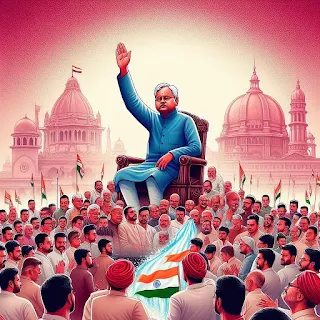पलटूराम
Decoding the Phenomenon of पलटूराम: Exploring Neetish Kumar's Impact as CM of Bihar and Why People Call Him So
In the dynamic landscape of Indian politics, figures emerge that capture the imagination of the masses, leaving an indelible mark on the socio-political fabric of the nation.
One such figure is Neetish Kumar, the former Chief Minister (CM) of Bihar, whose leadership style and political maneuvers have earned him the moniker "पलटूराम."
In this comprehensive exploration, we delve into the significance of Neetish Kumar's tenure as CM of Bihar, the reasons behind the popular epithet "पलटूराम," and the broader implications of his political career.
Neetish Kumar: A Political Journey
Born on March 1, 1951, in Bihar, Neetish Kumar's foray into politics began during his student years, where he actively participated in student movements.
His initial years were marked by his association with the socialist movement led by stalwarts like Jayaprakash Narayan.
Neetish Kumar's political trajectory saw him aligning with various parties before eventually emerging as a prominent leader in his own right.
In 2005, Neetish Kumar assumed the role of Chief Minister of Bihar, heralding a new era in the state's politics.
His tenure was characterized by a strong emphasis on development initiatives, particularly in sectors like education, healthcare, and infrastructure.
Under his leadership, Bihar witnessed significant progress, shedding its erstwhile image of lawlessness and underdevelopment.
पलटूराम: Unraveling the Epithet
The term "पलटूराम" gained currency in political discourse, especially in Bihar, during Neetish Kumar's tenure as CM.
Derived from the Hindi word "पलटू" meaning "turncoat" or "flip-flop," the epithet encapsulates the perception of Neetish Kumar's political maneuvering and alliances.
Critics and opponents often use the term "पलटूराम" to allude to Neetish Kumar's penchant for switching political allegiances for his vested interests.
His decision to form alliances with different parties at different points in his career has invited both admiration and criticism from various quarters.
While some view it as pragmatic politics aimed at furthering Bihar's development agenda, others see it as opportunistic and devoid of ideological moorings.
The Enigma of Neetish Kumar
Neetish Kumar's political persona is a complex tapestry of pragmatism, populism, and ambition.
His ability to navigate the intricate maze of Indian politics, marked by shifting alliances and caste dynamics, has earned him both admirers and detractors.
The enigma surrounding Neetish Kumar lies in deciphering the motivations behind his political decisions and understanding the nuances of his governance model.
As CM of Bihar, Neetish Kumar's policies prioritized inclusive development, with a focus on empowering marginalized communities and addressing socio-economic disparities.
His emphasis on education and healthcare earned him praise from various quarters, positioning him as a leader committed to the welfare of his constituents.
Legacy and Impact
Neetish Kumar's legacy as CM of Bihar is a subject of much debate and analysis.
While his supporters credit him with transforming Bihar into a growth engine and restoring law and order, critics point to persistent challenges such as unemployment and corruption.
The true impact of Neetish Kumar's tenure lies in its long-term implications for Bihar's trajectory and the lessons it offers for Indian politics at large.
The epithet "पलटूराम" serves as a microcosm of the complexities inherent in Neetish Kumar's political persona.
It encapsulates the contradictions and controversies surrounding his career while also underscoring the resilience and adaptability that have been hallmarks of his leadership.
In the annals of Indian politics, figures like Neetish Kumar occupy a unique place, shaping the discourse and trajectory of the nation's socio-political landscape.
As we unravel the phenomenon of "पलटूराम" and delve into Neetish Kumar's tenure as CM of Bihar, we confront the complexities and contradictions that define contemporary Indian politics.
Whether hailed as a visionary leader or derided as a political opportunist, Neetish Kumar's legacy serves as a prism through which we can understand the intricacies of power, governance, and public perception in a diverse and dynamic democracy like India.













Comments
Post a Comment